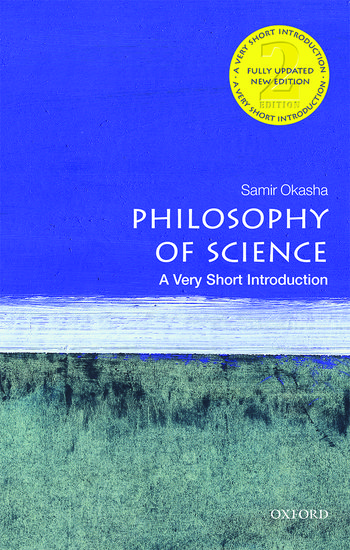Home >
A Very Short Introduction >
Philosophy of Science: Very Short Introduction (2nd edition) (Philosophy)
A Very Short Introduction | Philosophy
Philosophy of Science: Very Short Introduction (2nd edition)
ISBN: 9780198745587
Series: A Very Short Introduction
Philosophy of Science: Very Short Introduction (2nd edition) (Philosophy)
A Very Short Introduction Philosophy of Science: Very Short Introduction (2nd edition) (Philosophy) Media > Books > Non-Fiction > Education Books Expect Delays of Up to 4 Weeks| Order Below |
ISBN
9780198745587 (10-digit ISBN: 0198745583)
- Description
- Key Features
- Series Description
- Table of Contents
- Looks at both the historical and contemporary challenges of the philosophy of science, considering core debates such as the two opposing schools of thought of realism and idealism
- Addresses key questions such as the issue of scientific change, and whether there is a discernible pattern to the way scientific ideas change over time
- Investigates fascinating ethical and philosophical questions across a variety of scientific fields including physics, biology and psychology
- Discusses the controversial "science wars"
How much faith should we place in what scientists tell us? Is it possible for scientific knowledge to be fully "objective?" What, really, can be defined as science? In the second edition of this Very Short Introduction, Samir Okasha explores the main themes and theories of contemporary philosophy of science, and investigates fascinating, challenging questions such as these.
Starting at the very beginning, with a concise overview of the history of science, Okasha examines the nature of fundamental practices such as reasoning, causation, and explanation. Looking at scientific revolutions and the issue of scientific change, he asks whether there is a discernible pattern to the way scientific ideas change over time, and discusses realist versus anti-realist attitudes towards science. He finishes by considering science today, and the social and ethical philosophical questions surrounding modern science.
Oxford's Very Short Introductions series offers concise and original introductions to a wide range of subjects--from Islam to Sociology, Politics to Classics, Literary Theory to History, and Archaeology to the Bible.
Not simply a textbook of definitions, each volume in this series provides trenchant and provocative--yet always balanced and complete--discussions of the central issues in a given discipline or field. Every Very Short Introduction gives a readable evolution of the subject in question, demonstrating how the subject has developed and how it has influenced society. Eventually, the series will encompass every major academic discipline, offering all students an accessible and abundant reference library.
Whatever the area of study that one deems important or appealing, whatever the topic that fascinates the general reader, the Very Short Introductions series has a handy and affordable guide that will likely prove indispensable.
Please note: As this series is not ELT material, these titles are not subject to discount.
1. What is science?
2. Scientific Inference
3. Explanation in science
4. Realism and anti-realism
5. Scientific change and scientific revolutions
7. Science and its critics
Further reading
Index
How much faith should we place in what scientists tell us? Is it possible for scientific knowledge to be fully "objective?" What, really, can be defined as science? In the second edition of this Very Short Introduction, Samir Okasha explores the main themes and theories of contemporary philosophy of science, and investigates fascinating, challenging questions such as these.
Starting at the very beginning, with a concise overview of the history of science, Okasha examines the nature of fundamental practices such as reasoning, causation, and explanation. Looking at scientific revolutions and the issue of scientific change, he asks whether there is a discernible pattern to the way scientific ideas change over time, and discusses realist versus anti-realist attitudes towards science. He finishes by considering science today, and the social and ethical philosophical questions surrounding modern science.
Key Features
- Looks at both the historical and contemporary challenges of the philosophy of science, considering core debates such as the two opposing schools of thought of realism and idealism
- Addresses key questions such as the issue of scientific change, and whether there is a discernible pattern to the way scientific ideas change over time
- Investigates fascinating ethical and philosophical questions across a variety of scientific fields including physics, biology and psychology
- Discusses the controversial "science wars"
Series Description
Oxford's Very Short Introductions series offers concise and original introductions to a wide range of subjects--from Islam to Sociology, Politics to Classics, Literary Theory to History, and Archaeology to the Bible.
Not simply a textbook of definitions, each volume in this series provides trenchant and provocative--yet always balanced and complete--discussions of the central issues in a given discipline or field. Every Very Short Introduction gives a readable evolution of the subject in question, demonstrating how the subject has developed and how it has influenced society. Eventually, the series will encompass every major academic discipline, offering all students an accessible and abundant reference library.
Whatever the area of study that one deems important or appealing, whatever the topic that fascinates the general reader, the Very Short Introductions series has a handy and affordable guide that will likely prove indispensable.
Please note: As this series is not ELT material, these titles are not subject to discount.
EASY ORDER FORM
PRICES LISTED INCLUDE CONSUMPTION TAX
Price Before Tax:
¥1,790


